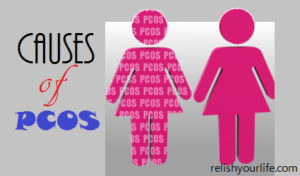While the cause of PCOS is unknown and is being researched there do appear to be connections with insulin resistance, lifestyle, environment and family history.
One of the roles of insulin is to keep the levels of glucose in the blood from rising after eating. Being insulin resistant, the body doesn’t use the available insulin effectively to help keep the glucose levels stable. Because the insulin is not working effectively, the body produces more insulin. These high levels can increase the production of androgens such as testosterone, in the ovaries. This contributes to excessive hair growth and acne, and can contribute to symptoms such as irregular periods, difficulty in ovulating, and acne. Insulin resistance is present in up to 80 per cent of women with PCOS and this can contribute to an increased risk of developing type 2 diabetes and cardiovascular disease. This means women with PCOS can have:
- Insulin resistance as a result of genetic factors
- Insulin resistance as a result of being overweight (related to diet and inactivity)
- A combination of both of these factors
Though not directly related insulin resistance is caused in part by lifestyle factors including being overweight because of a choice of diet or physical inactivity.
Being high on body weight worsens insulin resistance and the symptoms of PCOS. Some women with PCOS report that when they were in the correct weight range, they don’t have symptoms such as menstrual irregularity or excessive hair growth. These symptoms only appear once they gain weight. A healthy lifestyle of nutritious food and physical activity can assist in treating PCOS and in preventing it.
Family history
Immediate female relatives (i.e. daughters or sibling) of women with PCOS have up to a 50 per cent chance of having PCOS. It is observed that type 2 diabetes is also a common factor among families with PCOS.
Health problems linked to PCOS
Women with PCOS appear to be at increased risk of developing the following health problems during their lives:
- Type 2 diabetes
- Insulin resistance (if they don’t already have it)
- Cholesterol and blood fat abnormalities
- Cardiovascular disease (heart disease, heart attacks and stroke)
- Endometrial carcinoma (cancer)
- Sleep apneoa
Read more about PCOS follow the links





